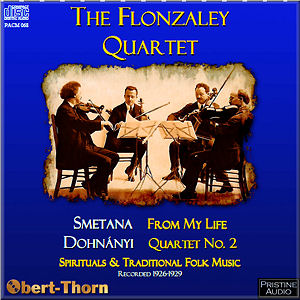 |
 |
|

Availability
CD & Download: Pristine Classical
|
Bedrich SMETANA (1824-1884)
String Quartet in E Minor, “From My Life” (1876) [24:47]
rec. 19 - 20 March, 1929 in Victor Studio No. 1, Camden
Ernst von DOHNÁNYI (1877-1960)
String Quartet No. 2 in D Flat Major, Op. 15 (1906)[25:12]
rec. 20 - 21 October, 1927 in Victor Studio No. 1, Camden
Spirituals
Go down, Moses; Swing low, sweet chariot (arr. Alfred Pochon) [4:40]
rec. 11 February, 1926 in the Victor Studios, Camden
Deep River (arr. Alfred Pochon) [3:45]
rec. 4 January, 1927 in Victor Studio No. 3, Camden
Alfred POCHON (1878-1959)
Irish Cradle Song [3:21]
rec. 10 February, 1926 in the Victor Studios, Camden
Traditional
Irish Reel (arr. Alfred Pochon) [2:30]
rec. 4 January, 1927 in Victor Studio No. 3, Camden
Sally in our alley (Old English Tune) (arr. Alfred Pochon) [3:34]
rec. 3 May, 1929 in Victor Studio No. 1, Camden
Turkey in the straw (arr. Alfred Pochon) [2:36]
rec. 30 April, 1929 in Victor Studio No. 1, Camden
 Flonzaley Quartet (Adolfo Betti,
(violin I): Alfred Pochon, (violin II): Nicolas
Moldavan, (viola): Iwan d’Archambeau, (cello)) Flonzaley Quartet (Adolfo Betti,
(violin I): Alfred Pochon, (violin II): Nicolas
Moldavan, (viola): Iwan d’Archambeau, (cello))
rec. 1926-1929
 PRISTINE AUDIO PACM 068 [70:20] PRISTINE AUDIO PACM 068 [70:20] 
|
|
|
Collectors will know - and transfer engineer Mark Obert-Thorn
reiterates the point in his jewel-case notes - that many of the
Flonzaley Quartet’s electrical recordings were issued by
Biddulph in the 1990s. He has recently transferred the quartet’s
Christmas Carol sides for Pristine Audio - which I reviewed recently
- and has now completed the job with this fine disc.
The focal points are the Smetana and Dohnányi quartets,
but the lighter side of things should on no account be overlooked.
The London’s abridged acoustic recording may be earlier
and the Bohemian’s may be more famous, but the Flonzaley’s
1929 recording of the Smetana E minor possesses wonderful and
salient qualities of its own. Foremost among them is the light,
wristy, subtle approach which, allied to the sparing use of vibrato,
adds a Gallic patina to the music making. This is, to be sure,
very different to the modernity of the London Quartet, or to
the echt-Czech qualities of the Bohemian, but no less exciting.
It exudes, in short, French lyricism, artistry of delightful
lightness and also fine intonation. The recording was a good
one and the Victor ‘Gold’ used to transfer was evidently
in fine heart; we can hear the inner voices perfectly and thus
appreciate the old adage of a quartet only being as good as its
second violin (the Bohemian Quartet’s second violin for
example was the composer Josef Suk). The unison playing in the
slow movement is sonorous without becoming inflated or over-saturated
in the Russian way, and the scherzo has requisite rhythmic brio.
The tremolandi and sense of drama in the finale are well conveyed.
The companion work is Dohnányi’s Second Quartet
of 1906. This was recorded a little earlier, in October 1927
in the same venue, Victor’s Camden studio No.1. It’s
a resonant and attractive three movement work that is a fine
vehicle for the Flonzaley. Its lissom freedoms are attractively
explored and the marvellously rapid articulation of the central
movement attests to the technical adroitness of the foursome.
They play the hymnal-leaning melodic lines with great finesse
and care over bow weight and tonal matching. Similarly the finale’s
counterpoint and return to hymnal seriousness are compellingly
presented. It’s no wonder that the upper voices remained
so strong; by this point Adolfo Betti and Alfred Pochon had been
performing together in the quartet for over twenty years.
The ‘fillers’ are delightful. The spirituals perhaps
remind one of violinist Maud Powell’s pioneering transcriptions
in this arena. Refinement and elegance are the watchwords, and
a certain nobility of utterance too. Pochon’s Irish
Cradle Song possesses an elfin artfulness and prefaces the
traditional Irish Reel - recorded a year apart. Both this
and Sally in our alley were without question London String
Quartet territory, the Flonzaley’s friendly rivals who
recorded for Columbia. The Victor riposte is highly engaging.
There is some inherent mechanical noise on some tracks but it’s
pretty insignificant stuff. Treble frequencies have been retained
and room ambience is very much audible. Splendid work all round,
and a fitting conclusion to the run of the Flonzaley’s
electric discs.
Jonathan Woolf
|
|




 All Nimbus reviews
All Nimbus reviews








